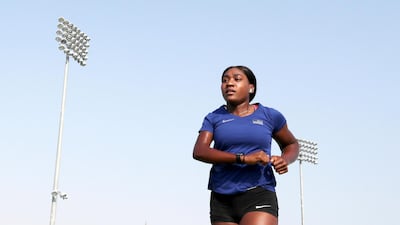When US Paralympian Deja Young sprints down the track she has a single thought on her mind: to be the best.
Off the field, the defending sprint champion encourages open conversations about depression and mental fitness that she says are as important as physical well-being.
At the World Para Athletics Championships in Dubai, where she will defend her Rio Paralympics 2016 sprint double titles, the 23-year-old athlete hopes to continue her work as a mental health advocate by speaking of her own struggles with anxiety in the hope that it will save lives.
The Texan earned gold medals in the 100m and 200m in the T46 classification, which includes athletes with a disability in their arms.
Ms Young was born with brachial plexus, or shoulder dystocia, which caused nerve damage and limited mobility in her right shoulder.
She suffered a mental breakdown just a few months before the Rio Games, triggered by performance pressure and falling behind in studies at college.
"I felt no one really understood me and I just spiralled," she told The National.
“I didn’t talk to anyone and finally I broke, had a suicide attempt and ended up in hospital. It was literally two months before the games and I had a decision to make to see whether I was strong enough to make it.”
The support of friends and family helped her pull through and gave her the strength to compete.
The first step, she said, was asking for help.
“When you ask for help, you show you really want to fight for your life, you want to live,” she said.
“That was my first step to recovery. It was also my pride because I don’t like asking for help. It’s so hard when you’re in that situation thinking that nobody cares but there are so many people who want to help and different outlets.”
Ms Young grew up competing in regular teams. A strong softball and volleyball player, she concentrated on athletics in high school to improve her chances of securing a college scholarship.
But several of them turned her down because she could not ‘fix’ her running form.
Due to her disability, her right arm moves across her torso instead of pumping in front to support an athlete’s running action.
“There were many barriers, it was really hard,” she said.
“I literally had one coach tell me if you can’t fix your form we don’t want you.”
Eventually, she was accepted to Wichita State University on a full track scholarship and graduated last year.
It was at university that she first heard about the Paralympics and describes it as a homecoming of sorts.
She said her first World Championships, in Doha in 2015, were an eye-opener.
“It was a shock. I was like, ‘Oh my god, there are people walking around without legs and competing at this high level',” she said.
“I finally found a community of people I could relate to who went through the same challenges as me. It felt like I was at peace, like I was at home finally.”
She urges families to recognise the talent in children with disabilities.
“Just as a family with a child who is really smart or talented in art, they need to know their child is just as special,” Ms Young said.
In Dubai, she tunes out the tension by practicing breathing, relaxation techniques and being self-aware.
"Three years later, I’m still struggling. I’m very anxious, very nervous, but it’s OK because the mind is so powerful,” she said.
“Athletics helps because it is my outlet but it is also a lot of pressure. I have realised I cannot depend on it (athletics) for my happiness. I’m going to have failures, bad days and bad meets so I have to find my happiness within myself first.”
The process has made her stronger and it will be a different athlete who takes on the competition in Dubai.
Ms Young plans to compete in the 400m and long jump at the Tokyo Paralympics next year.
“I realised I was taking the joy out of what I was doing so I needed to calm down,” she said.
“The track is a sacred place for me. I try not to bring any of my baggage or anything that I have going on outside. So when I get to the track it’s like nothing else matters. I’m in the best shape of my life. I realise now whatever happens, happens.”

